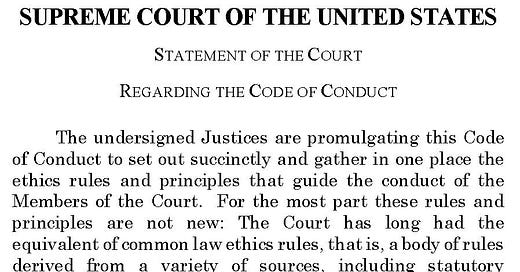Bonus 53: One-and-a-Half Cheers for the "Code of Conduct"
The Supreme Court made a major concession to public pressure on Monday. A little bit of candor and humility could have made it a lot more convincing.
Welcome back to the weekly bonus content for “One First.” Although Monday’s regular newsletter will remain free for as long as I’m able to do this, much of Thursday’s content is behind a paywall to help incentivize those who are willing and able to support the work that goes into putting this newsletter together every week. I’m grateful to those of you who are already paid subscribers, and hope that those of you who aren’t will consider a paid subscription if your circumstances permit:
One of the central distinctions between the substance of Monday’s free issues and that of Thursday’s bonus content is the personalization of the latter. The topic for this week is an obvious one: The Court’s release on Monday of its first-ever “Code of Conduct”—a set of ethics principles to which the justices unanimously assented, and which they say they will follow. Readers of this newsletter will be familiar with the argument I made on Tuesday night an op-ed for CNN—that even the most rigorous ethics rules won’t mean that much without meaningful pressure on the justices to follow them, pressure that Congress could help to create by, among other things, establishing an Article III Inspector General along the lines I sketched out a few weeks ago.
Rather than rehash those points here, I thought I’d use today’s bonus issue to make two other points that, at least from my perspective, haven’t been getting enough attention in the media coverage. The first is the significance of the fact that the justices felt impelled to adopt a Code in the first place—and what that says about the continuing importance of meaningful public discourse about, and enlightened criticism of, the Supreme Court.
The second, related point is to focus on the cryptic statement that the justices released alongside the Code—a statement that could and should have been conciliatory, and instead reflects a rather remarkable lack of contrition or humility. If the justices want to persuade any of their critics that they can be trusted to carefully follow the rules to which they’ve now chosen to subject themselves, a little bit of candor could have gone a long way.
For those who are not paid subscribers, the next free installment of the newsletter will drop on Monday morning. For those who are, please read on.
Keep reading with a 7-day free trial
Subscribe to One First to keep reading this post and get 7 days of free access to the full post archives.



